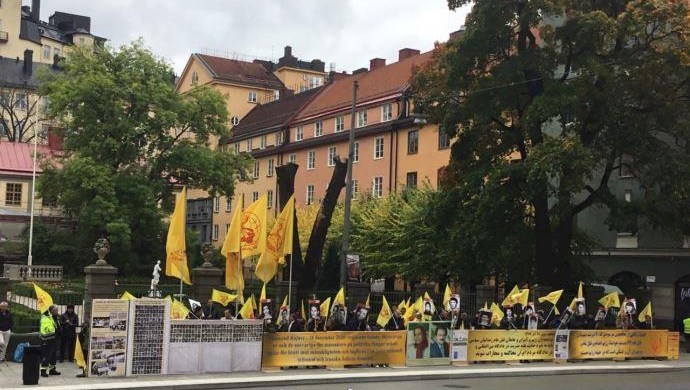Reporting by PMOI/MEK
Iran, September 29, 2021—Tuesday marked the seventeenth session of the trial of Hamid Nouri, a prison guard charged with torturing inmates in Iran’s prison and taking part in the 1988 massacre of thousands of political prisoners. Nouri is being tried in a Swedish court after being apprehended during a trip to the country. As one of the authorities of Gohardasht Prison (Karaj), Nouri is now standing trial in a court in Stockholm, where many of his victims are giving harrowing testimonies of how he and other regime officials brutally tortured prisoners.
In Tuesday’s court session, former political prisoner Ahmad Ebrahimi testified against Nouri and other regime authorities. Ebrahimi was arrested in 1981 on charges of supporting the People’s Mojahedin Organization of Iran (PMOI/MEK) and was sentenced to 10 years in prison. Ebrahimi spent time in the notorious Evin prison, Ghezel Hesar, Qom prison, and Gohardasht, where he witnessed the crimes of Nouri.
Ebrahimi said that in 1988, he was in the “death hall,” a corridor where political prisoners awaited their turn to meet the “death commission” and be sent to their deaths. The “Death Commission” was a group of judges who summoned political prisoners and tried them in kangaroo courts that lasted no longer than a few minutes. Ebrahimi met the death commission, which included former justice minister Mostafa Pourmohammadi and current regime president Ebrahim Raisi.
During the summer of 1988, the Iranian regime carried out the swift and brutal execution of more than 30,000 political prisoners, mostly MEK members and supporters. The purge was directly ordered by regime supreme leaders Ruhollah Khomeini in an edict that explicitly stated that anyone supporting the MEK is an enemy of God and deserves to be executed.
In his testimony, Ebrahimi said, “In March 1983 and after my first trial, I was sent from Qom to Ghezel Hesar. We were 90 people who had all received the death sentence. Twelve or thirteen were with Marxist groups and the rest were affiliated with the MEK. Every Sunday and Wednesday, they would take one of us for interrogation and execution. It was like a queue. We didn’t know whose turn it would be when Sunday and Wednesday came.”
Ebrahimi added, “When we were in solitary confinement, before being transferred to the public ward, that was when I first saw Hamid Abbasi [Nouri’s nickname]. He told us that we should be very careful and do nothing that hints at support for the MEK. Then they took us to the ordinary prisoners’ ward to break our character and will. They said there is no such thing as a political prisoner. The prisoners were very resilient. The guards who tortured the prisoners were Nasserian, Davood Lashgari, and Hamid Abbasi [Nouri].”
Regarding the 1988 massacre, Ebrahimi said that one day, the prison guards brought an inmate named Mehdi Fereydouni, who had been badly tortured. “On August 9, they took us to the death hall. They called out the names of the first group. None of us knew what was about to happen. They continued calling names and taking prisoners away. There were 80 or 90 people in our ward. Only three remained. We couldn’t believe that they were taking all the prisoners for execution, and the prisoners couldn’t believe it until they saw the bodies with their own eyes.”
Ebrahimi said that one day, Nasserian, one of the torturers, took him to a room where “seven or eight people were sitting,” including Pourmohammadi and Raisi.
Ebrahimi also said that during the 1988 massacre, he had heard from the prison guards that all breaks and leaves had been canceled.
Ebrahimi said that another prisoner had told him that Nouri had said, “Khomeini has told us to execute all of you. But we didn’t and you’re still alive. If we wanted to carry out [Khomeini’s] order, we would have to kill half the population. [Nouri] also said that [Khomeini’s] order still stands and the executions are not over. If any of you makes a mistake, then we will execute all of you.”
Other witnesses who have testified before the court have corroborated the same account.
While the court proceeded, a large group of Iranians resumed their protest rally in front of the court, calling for the prosecution of senior regime officials, including Raisi and supreme leader Ali Khamenei. Many of the protesters were family members of the thousands of dissidents murdered or executed by the regime.
The 1988 massacre has been described as a war crime and crime against humanity. Legal experts also recognize it as a “genocide” and should be addressed by international tribunals.





